Cynical fouling in hurling will continue until a fitting penalty is introduced
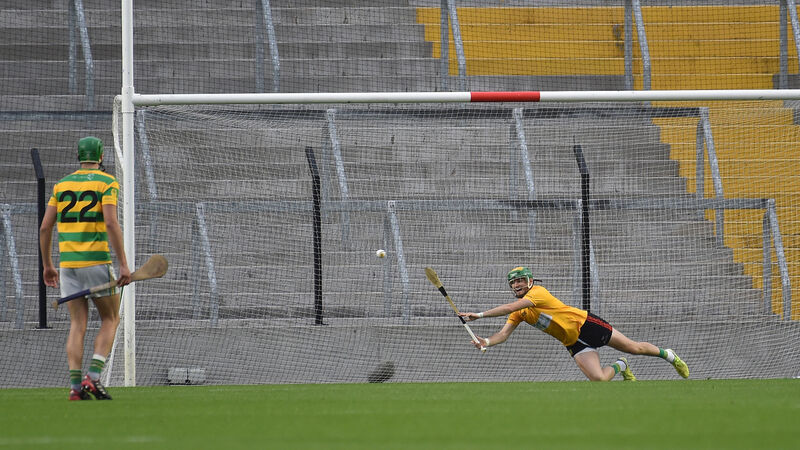
Blackrock keeper Gavin Connolly can't stop this penalty by Glen Rovers' Patrick Horgan. Awarding a penalty for stopping an obvious goal opportunity would surely cut down on cynical play. Picture: Dan Linehan
WHEN the Standing Committee on Playing Rules (SCPR) advanced their motion on the black card in hurling – which was hammered at last year’s Congress – to an even more radical proposal, nobody expected it to return like a boomerang with such dramatic effect.
As well as a black card, the motion also proposed that the prevention of “obvious” goal scoring chances by acts of cynical play would result in a penalty, in both hurling and football.
After receiving just 18% of the vote 12 months ago, the topic had become so topical during the championship – especially the hurling championship – that opinion was bound to change within the virtual committee rooms around the country.
The thrust of that temperature was taken from a virtual Central Council meeting in Croke Park two weeks ago. It was deemed by some to be a matter of urgency that the motion be on the clár of Congress later this month, especially when the remote Congress was taking place before the start of the hurling season.
Yet once the discussion was broadened out, the heat was bound to cool on the topic; four days after that Central Council meeting, a 90-minute meeting with county chairs and secretaries stalled the train.
The cooling point centred around the awarding of a penalty, which was considered too vague. With so many reservations around the wording of the proposal, the motion was returned to the SCPR for clarification; tweaks were inevitable if the motion was, firstly to make the floor of Congress and, secondly, to have any chance of being passed.
With a penalty to be awarded for the foul prevention of a goalscoring opportunity, the technical detail of what exactly constitutes “clear goalscoring opportunities” was bound to stir debate.
It’s easy to see why when there are so many grey areas around the topic. Is it a clear goalscoring opportunity if a player 20 metres from goal is pulled down by his marker, just one or two seconds before another covering defender would have cut off his path to goal if the play had developed?
How does the referee interpret the action if a defender makes a reasonable attempt to play the ball but the foul stops the attacking player releasing an unmarked attacker just coming off the shoulder who would have had a clear goalscoring opportunity?
Despite the introduction of VAR, that grey area is still a consistently controversial topic in professional soccer. A ‘professional foul’ in soccer involves a defender fouling an attacking player in order to prevent them scoring, or a handball offence that denied an obvious goal-scoring opportunity.
Technically, the offence is inaccurately referred to as the ‘last man’ foul, leading to the incorrect belief that if the ‘last’ defender commits a foul on an attacking player, they should automatically be sent off. Yet the terminology ‘last man’ has never been included in the laws of the game, because what constitutes an obvious goalscoring opportunity is left to the discretion of the referee.
Several factors are given to help referees decide; the distance between the offence and the goal; the likelihood of keeping or gaining control of the ball; the direction of the play, and the location and number of defenders. Even if a foul unambiguously prevents a goal, the laws of football have no provision for awarding the score as there is no equivalent of the penalty try in rugby.
Yet the head of the GAA’s referees development committee Willie Barrett recently stated his belief that the adjudication of both a goalscoring opportunity and what constitutes its cynical prevention would not pose major problems for match officials.
“From a refereeing point of view, it’s no different to any other big call, like a penalty,” said Barrett. “It’s very do-able. If the rule is there, prevention may cure the problem and these fouls won’t be seen as much. People say, ‘these things don’t happen in hurling’. Well, they are happening in hurling as well as football and we have to deal with it.”

Awarding a penalty in hurling though, would certainly increase the chances of scoring a goal, particularly given the high conversion rate of penalties; the average conversion rate in the 2018 and 2019 championships was 74%.
Yet the fact that penalties were such a non-factor in the 2020 hurling championship further illustrates how teams have done the maths and fouled accordingly; players weren’t allowed to travel that far and were cynically pulled down outside 13-metre line to prevent penalties. With the punishment only being a yellow-card, defenders know they have a licence to prevent goalscoring opportunities through cynical play.
The sin-bin is certainly a deterrent but awarding a penalty as well would go a long way towards changing the culture and eradicating a trend which is blighting the game.
The SCPR’s proposal is certainly ultra-radical, not just for the dual-whammy of a sin-bin and a penalty, but also because the hurling community has always so strongly resisted the black card/sin-bin.
That attitude has always existed in that grey space between denial and loose regulation, which subsequently granted a loose licence to practise cynical play. But there now seems to be a general acceptance that the systematic practise of fouling a player going through on goal, or likely to play a scoring pass, will continue unless there is a sufficient deterrent to prevent it.
More importantly, there needs to be a balance struck between what people want and what the game needs.
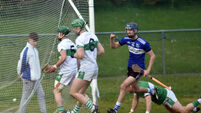
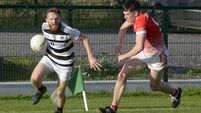

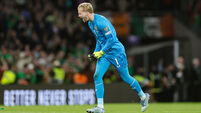

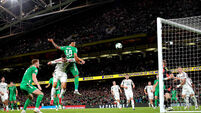
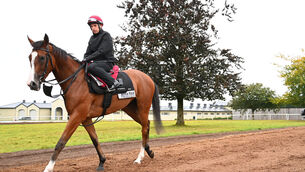
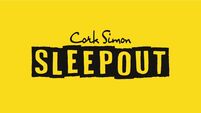


 App?
App?







